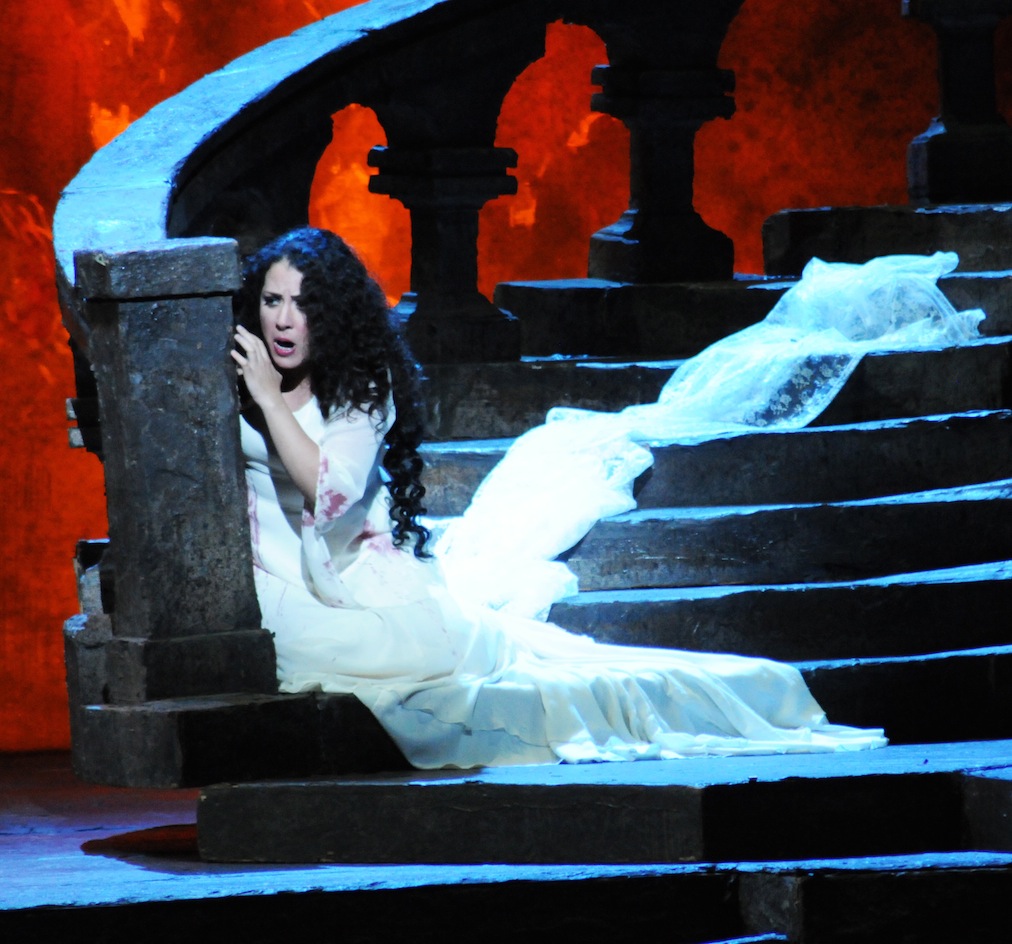Mexican soprano lifts Palm Beach Opera’s mediocre “Lucia”

Maria Alejandres starred in Palm Beach Opera's production of Donizetti's "Lucia di Lammermoor."
Maria Alejandres made an impressive role debut as the tragic heroine of Donizetti’s Lucia di Lammermoor in Palm Beach Opera’s season-closing production at the Kravis Center.
Winner of Placido Domingo’s Operalia Competition in 2008, the Mexican soprano proved a formidable singing actress, meeting both the vocal and dramatic demands of the role. Unfortunately, she almost had to carry the production alone as the usually reliable West Palm Beach company fielded a largely mediocre cast and a hammy, cliché-ridden production, heard at Sunday afternoon’s final performance.
On the plus side, count Bruno Aprea’s fiery conducting which captured the graceful bel canto melodies and dramatic power of the score. Except for a couple of horn fluffs, the orchestra was in fine form with particularly distinguished flute and harp solos. Greg Ritchey’s chorus sounded robust and vociferous.
Fernando Portari was a cipher vocally and dramatically as Lucia’s lover Edgardo, his tight, comprimario-sized voice strained at the top. As Enrico, Roman Burdenko proved a stock villain with a burly, vibrato-laden baritone. The weak singing of Portari and Burdenko made the inclusion of the often omitted Wolf’s Craig scene a dubious addition and the famous sextet in Act II lacked vocal heft and received only tepid applause at Sunday’s matinee.
The smaller roles were more consistently sung. Alfred Walker proved a dignified Raimondo, his rotund bass-baritone commanding attention at his every utterance. Evanivaldo Correa Serrano revealed a promising lyric tenor as the ill-fated bridegroom Arturo and Shirin Eskandani made the most of Alisa’s brief interjections with an attractive soprano and poised stage demeanor.
Sir Walter Scott’s tale of doomed lovers from rival Scottish clans with a heroine felled by madness was reduced to a melodramatic potboiler. Massimo Gasparon’s direction was mostly of the silent-movie variety, with the choral scenes marred by poorly conceived, often claustrophobic blocking. Henry Bardon’s decades-old production is still handsome and resolutely traditional, dimly lit by Ron Vodicka.
Despite the weak presentation, the performance came alive when Alejandres was on stage. She powerfully conveyed Lucia’s disintegration from hope to despair and instability leading to murder. In a mesmerizing Mad Scene, she wandered the stage, sometimes crawling in a state of unhinged delirium, unaware of anything around her.
Vocally, Alejandres seems a cross between the light coloratura Lucias of an earlier era and the larger, more dramatic voices of Callas or Sutherland. Her tone is somewhat covered but Alejandres’ lower register is strong and dusky and she met the coloratura demands with ease. Adapting some ornamentation to the vocal line, she turned the Mad Scene into a tour de force of fearless singing, always alive to the tragedy behind the coloratura roulades. Alejandres’ outstanding performance bodes well for her Juliette in Gounod’s opera at Florida Grand Opera next month, a role she has performed at Covent Garden and La Scala.
Posted in Performances
2 Responses to “Mexican soprano lifts Palm Beach Opera’s mediocre “Lucia””
Leave a Comment
Mon Mar 26, 2012
at 11:04 am
2 Comments
Posted Mar 27, 2012 at 2:40 pm by Dave Rosenbaum
Saw Friday night’s performance. I thought it was more like “Mediocre soprano bogs down Palm Beach Opera’s otherwise-pretty good Lucia”.
Posted Mar 28, 2012 at 8:42 pm by Elizabeth Porcaro
Maria Alejandres voice is the most beautiful I ever heard, and her acting superb. Glad to see young talented artist like her making it to sing in other countries.